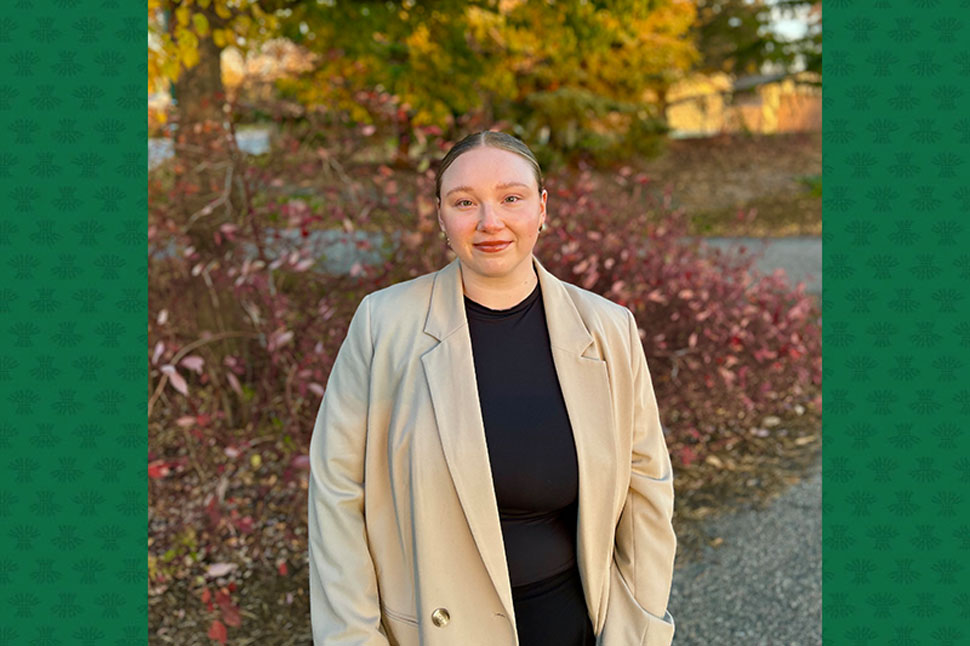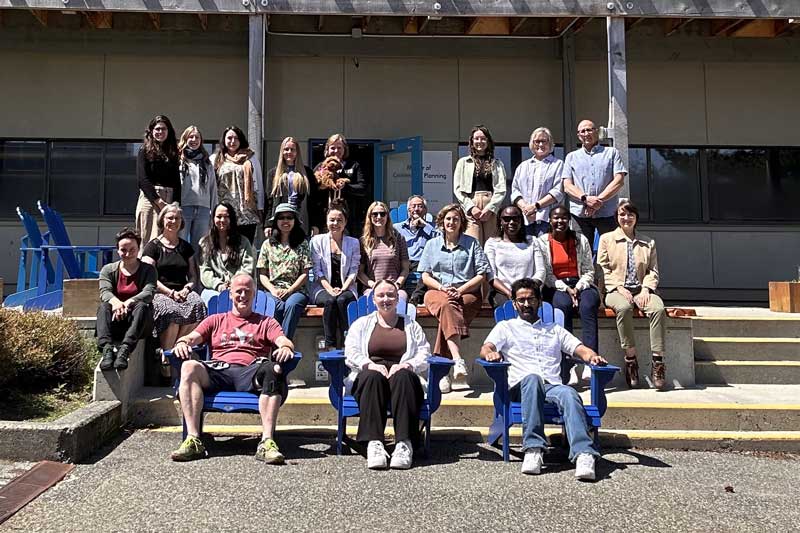
‘A truly enriching academic experience’
As a student in USask’s School of Environment and Sustainability (SENS), Marlis Merry (MSs’21) learned about the pressing issues that concern our planet and became inspired to make positive change
By SHANNON BOKLASCHUKMarlis Merry (MSs’21) believes her graduate education at the University of Saskatchewan (USask) has empowered her to “become an effective sustainability changemaker.”
Before coming to USask, Merry, who was born and raised in Richmond, B.C., earned a Bachelor of Arts degree in interdisciplinary studies, specializing in economics and environmental studies, at the University of British Columbia. When it came time to apply to a master’s degree program, she knew exactly where she wanted to study: USask’s School of Environment and Sustainability (SENS). At the school, students, faculty, and partners are working together to solve the pressing issues that concern our planet.
“My decision to study at the University of Saskatchewan was driven by the School of Environment and Sustainability’s strong focus on collaborative, engaged research and practice to address sustainability issues at both local and global scales, which was evident in the expertise of the SENS faculty and the curriculum of my program,” she said.
“I was also drawn to the opportunity to learn from faculty whose research aligned closely with my interests, as well as SENS’ strong sense of community.”
Merry earned her Master of Sustainability degree in regenerative sustainability at USask in 2021. The mission of the program’s regenerative sustainability stream is to empower graduates to catalyze positive, transformative changes in socio-ecological systems by engaging with the latest developments in sustainability thinking and practice. Today, as a SENS graduate, Merry is employed at USask as the program manager for TRANSECTS, the Transdisciplinary Education Collaboration for Transformations in Sustainability. TRANSECTS is a transdisciplinary research training partnership that reconfigures sustainability science education, prepares graduates to be the next generation of sustainability changemakers, and offers opportunities for intercultural learning through shared international experiences and comparative analysis across the Global North and South.
The Green&White recently asked Merry about her experiences as a SENS graduate student, how her education has been an asset in her career, and what she’s working on in her current role with TRANSECTS.
Why did you choose to pursue a Master of Sustainability degree?
I was interested in the regenerative sustainability program as an opportunity to learn how to rethink the concept of sustainability in practice, moving towards regenerating interconnected ecological and social systems in support of thriving ecosystems and communities. I also appreciated the program’s emphasis on bringing together students from a wide variety of disciplines, including both social and natural science backgrounds.
What was the best part of your program in regenerative sustainability?
As the graduate program was project-based, it included a project placement with a partner organization as part of the degree requirements. I had the valuable opportunity to collaborate with a sustainability consulting company to develop a framework and tools designed to enhance the accessibility and highlight the benefits of community-scale renewable energy projects in Saskatchewan. I was truly honoured to be selected to receive an Excellence in Environment and Sustainability Graduate Award from SENS, which is granted annually to a graduate student in each program whose thesis or project makes an outstanding contribution to the field of environment and sustainability. I am now serving as the external advisor on behalf of TRANSECTS for a student’s project placement—a role that feels especially meaningful, as it represents a full-circle moment in my journey.
What was your experience like in the School of Environment and Sustainability?
I thoroughly enjoyed the opportunity to learn from the School of Environment and Sustainability faculty throughout my program. Their diverse expertise and emphasis on transdisciplinary theory and practice contributed to a truly enriching academic experience.
Why would you recommend SENS to prospective students?
SENS is an ideal environment for emerging sustainability scholars and practitioners interested in addressing complex, real-world sustainability challenges.
How has your education at SENS benefited you in your career?
My education at SENS profoundly influenced my career by equipping me with both the professional and relational skills needed for transformative sustainability research and practice, empowering me to become an effective sustainability changemaker.
You are now employed as the TRANSECTS program manager. What is TRANSECTS, and how is it helping to transform sustainability?
I am truly grateful for the opportunity to continue being part of the SENS community as the TRANSECTS program manager and country coordinator in Canada. The Transdisciplinary Education Collaboration for Transformations in Sustainability (TRANSECTS) is an international community of practice and a transdisciplinary research training partnership that reconfigures sustainability science education and research by championing transdisciplinary research and practice for transformational and meaningful change. Our goal is to empower emerging scholars, professionals, and practitioners to become sustainability changemakers by providing professional, relational, and intercultural competencies through innovative and flexible intercultural educational pathways.

Who can get involved in TRANSECTS, and how can they get involved?
There are several ways to become part of the TRANSECTS network. We encourage everyone to visit our website, connect with us on LinkedIn and Instagram, or contact transects@usask.ca to learn more.
We offer multiple education pathways for all learners, including Transdisciplinary International Learning Labs (TILLs) and continuing education courses. We look forward to launching a pilot continuing education course later in 2025.
The Student and Trainee Advisory Round Table (START) is a student- and trainee-led group that supports TRANSECTS on engaging students and trainees in transdisciplinary learning and TRANSECTS activities. Any early career researchers and practitioners interested in transdisciplinarity and sustainability are welcome to join the START. To learn more about the TRANSECTS Youth Network for Transdisciplinarity, they are encouraged to join the LinkedIn group or contact start@usask.ca.
We also have country hubs in Canada, Germany, and South Africa for TRANSECTS members and partner organizations. The international TRANSECTS team of researchers and partners involves representatives from academia, Indigenous and rural communities, UNESCO biosphere reserves, governing agencies, international networks, and private and civil society organizations and foundations.
Why is it important to address complex sustainability issues through an interdisciplinary approach?
Addressing complex social and environmental sustainability challenges requires collaborative and engaged work towards shared goals. Central to this is the ability to bring together diverse groups of academics, practitioners, and shared responsibility holders to co-create knowledge and solutions. Fostering professional, relational, and intercultural skills is essential for research and practice that is locally determined, co-developed, and capable of creating meaningful, lasting impact.
Is there anything else that you would like to add?
We are excited to introduce a new section of our website, highlighting reflections and testimonials from those involved in TRANSECTS, as well as visual stories from our training, mentoring, and knowledge mobilization activities. I would like to express my sincere gratitude and appreciation to Drs. Maureen Reed and James Robson for their lasting impact on my growth as an emerging professional, and I would like to thank everyone within the TRANSECTS network for their commitment to the partnership.


